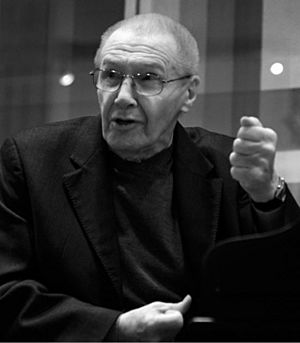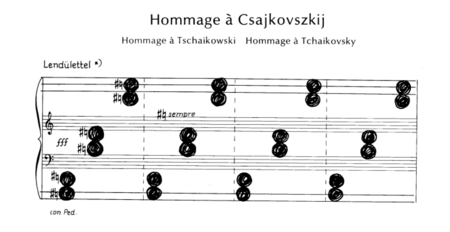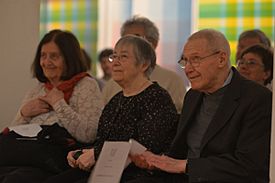György Kurtág facts for kids
Quick facts for kids
György Kurtág
|
|
|---|---|

Kurtág in 2014 by Lenke Szilágyi
|
|
| Born | 19 February 1926 Lugoj, Romania
|
| Occupation |
|
|
Notable work
|
List of compositions |
| Spouse(s) | |
György Kurtág (born February 19, 1926) is a famous Hungarian composer and pianist. He writes a special kind of music called contemporary classical music, which means it's new music written in a classical style. His music is known for being very short and powerful, often sounding like it's telling a story right away. Many people see him as one of the last living connections to important composers who created new music after World War II.
He also taught piano at the Franz Liszt Academy of Music starting in 1967. Later, he taught chamber music, which is music for small groups of instruments. He taught there until 1993.
Contents
Life and Career
Early Life and Education
György Kurtág was born on February 19, 1926, in Lugoj, Romania. His parents were Jewish Hungarians. When he was 14, he started taking piano lessons from Magda Kardos. He also studied how to compose music with Max Eisikovits in Timișoara.
In 1946, he moved to Budapest, the capital of Hungary. He became a Hungarian citizen in 1948. He began studying at the Franz Liszt Academy of Music. There, he met his future wife, Márta Kinsker, and another composer, György Ligeti, who became a close friend.
His piano teacher at the academy was Pál Kadosa. He studied composition with Sándor Veress and Ferenc Farkas. He also learned about chamber music with Leó Weiner and music theory with Lajos Bárdos. He finished his piano and chamber music studies in 1951 and got his composition degree in 1955. He married Márta in 1947, and their son, György, was born in 1954.
A Turning Point in Paris
After the Hungarian Revolution of 1956, Kurtág spent time in Paris from 1957 to 1958. This period was very important for him. He studied with famous composers like Max Deutsch, Olivier Messiaen, and Darius Milhaud.
During this time, Kurtág was feeling very sad. He said he felt like everything he believed was true wasn't. He got help from an art psychologist named Marianne Stein. She encouraged him to start composing using the simplest musical ideas. This helped him feel better and greatly boosted his artistic growth. While in Paris, he also discovered the music of Anton Webern and the plays of Samuel Beckett.
When he returned to Budapest in 1959, he composed a string quartet. This piece marked a major change in his music, and he called it his first important work, or Opus 1. He dedicated it to Marianne Stein.
Teaching and International Recognition
Kurtág worked as a music coach at the Bartók Music School from 1958 to 1963. He also worked at the National Philharmonia in Budapest from 1960 to 1968. In 1967, he became a professor of piano at the Franz Liszt Academy. Later, he also taught chamber music there until 1993. Some of his students included famous pianists like Zoltán Kocsis and András Schiff.
Kurtág's music started to gain international attention in 1968. His biggest work at the time, The Sayings of Peter Bornemisza, was performed in Germany. However, it wasn't until his piece Messages of the Late Miss R.V. Troussova was performed in Paris in 1981 that he truly became known worldwide.
Since the early 1990s, he has worked more and more outside Hungary. He was a composer-in-residence with the Berlin Philharmonic from 1993 to 1995. He also worked with the Vienna Konzerthaus Society in 1995. He lived in the Netherlands (1996–1998) and again in Berlin (1998–1999). From 1999 to 2001, he lived in Paris. Kurtág and his wife lived near Bordeaux, France, from 2002 to 2015, then moved back to Budapest. Márta, his wife, passed away in October 2019.
Music Style

Kurtág composes music very carefully and slowly. In 1985, when he was 59, he had only finished 23 main works. Some pieces were never finished or he took them back to change them.
His compositions often have many very short parts, called movements. For example, Kafka Fragments is a 55-minute piece for a singer and a solo violin. It has 40 short movements, using words from Franz Kafka's writings. Music writer Tom Service said that Kurtág's music often makes pieces very short, lasting only seconds or a minute or two. One of his piano pieces, "Flowers We Are, Mere Flowers," has only seven notes! Because he likes to write such short pieces, Kurtág's music is often compared to that of Anton Webern.
Before his piece Stele (written for the Berlin Philharmonic), Kurtág mainly wrote music for singers, choirs, and small groups of instruments. After Stele, he started writing larger pieces for orchestras, like Messages and New Messages. Kurtág has only written one opera, called Fin de partie. It is based on Samuel Beckett's play Endgame. It was first performed in Milan, Italy, on November 15, 2018.
Starting in the late 1980s, Kurtág wrote music where the instruments are spread out in the performance space. His piece … quasi una fantasia… for piano and ensemble, first played in 1988, was the first time he explored music that surrounds the audience.
Kurtág often taught special classes called master classes for chamber music. He also performed concerts with his wife, Márta. They played many pieces for two or four hands on the piano from Kurtág's ten-volume collection called Játékok (which means "Games"). They also played simplified versions of other famous pieces.
Most of Kurtág's music is published by Editio Musica Budapest. Some is published by Universal Edition in Vienna and Boosey & Hawkes in London.
Awards and Recognition
György Kurtág has received many awards for his amazing music. Here are some of them:
- In 1973, he received the Kossuth Award from the Hungarian government for his lifetime achievements.
- He was given the Officier of the Ordre des Arts et des Lettres in France in 1985.
- In 1996, he received the Austrian Ehrenzeichen.
- He won the Ernst von Siemens Music Prize in 1998, which is a very important award in music.
- He became an Honorary Member of the American Academy of Arts and Letters in 2001.
- In 2006, he received the Grawemeyer Award for his composition …concertante… Op. 42.
- In 2014, he received the BBVA Foundation Frontiers of Knowledge Award for Contemporary Music. The judges said his music has "rare expressive intensity."
- In 2024, he received the Wolf Prize, an international award from Israel, for his important contributions to the world's culture.
Many festivals and organizations have celebrated Kurtág's work. In 2004, he was the featured composer at the Rheingau Musik Festival. In February 2006, for his 80th birthday, the Budapest Music Centre held a festival in his honor. Other major music festivals in Berlin, Vienna, Holland, and Paris also dedicated special programs to his music that year.
Awards List
- Erkel Prize (1955, 1969)
- Kossuth Prize (1973)
- UNESCO's International Rostrum of Composers (1983)
- Music Prize of the Prince Pierre of Monaco Foundation (1993)
- International Antonio Feltrinelli Prize (1993)
- Composers Award of the State of Austria (1994)
- Denis de Rougemot Prize of the European Festivals Association (1994)
- Kossuth Prize for Lifetime Achievement (1996)
- Austrian Decoration for Science and Art (1997)
- Composers Award "Promotion of the European economy" (1998)
- Ernst von Siemens Music Prize (1998)
- Honorary Prize for Art and Science of the Institute for Advanced Study Berlin (1999)
- Pour le Mérite for Science and Art (1999)
- Foundation for Contemporary Arts Grants to Artists Award (2000)
- Commander with Star of the Order of Merit of the Republic of Hungary (2001)
- John Cage Award (2003)
- Sonning Award (2003; Denmark)
- Grand Cross of Merit of the Republic of Hungary (2006)
- University of Louisville Grawemeyer Award for Music Composition (2006; U.S.)
- Honorary member of the Union of Composers and Musicologists from Romania (2008)
- Golden Lion of the Venice Biennale for lifetime achievement (53rd International Festival of Contemporary Music; 2009)
- Zürich Festival Prize (2010)
- Royal Philharmonic Society Gold Medal (2013)
- BBVA Foundation Frontiers of Knowledge Award in Contemporary Music (2014)
- Fellow of the American Academy of Arts and Sciences (2015)
- Rolf Schock Prize (2020)
- The Wolf Prize (2024)
See also
 In Spanish: György Kurtág para niños
In Spanish: György Kurtág para niños
 | Dorothy Vaughan |
 | Charles Henry Turner |
 | Hildrus Poindexter |
 | Henry Cecil McBay |


